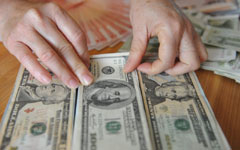Thorsen added, "You really see London and Frankfurt willing to position themselves and maybe offer additional products beyond the clearing activity going forward. Yes, it is going to boost the yuan."
She continued, "With an expansion in trade with Asian countries more and more corporates may be willing to do business in yuan, maybe a substitution from other currencies like the US dollar."
 |
Thorsen said that London is one of the "really major FX trading centers, that is one of their big big strengths".
In addition, London could point to its strength in the securities market, said Thorsen. She anticipated that there may be more financial products for investment starting to build up in yuan.
Last week results of a quantitative survey for the City of London Corporation carried out by Bourse Consult showed strong growth in 2013 in the use of yuan in trade finance by corporations in London.
The total amount of yuan denominated trade financing was nearly 43 billion yuan, a 10 percent increase on 2012, with the most significant growth seen in export financing.
In terms of volume, the Bourse Consult report found that London's strength was in foreign exchange trading, with a 140 percent increase over 2012 to reach an average daily value of $18.7 billion on trading in deliverable products, which overtook non-deliverable in the majority market share for the first time as result of greater yuan liquidity.
But it's not just the amounts which are increasing, it is also the share of the trade that is carried out in yuan that is increasing, as the latest SWIFT figures show.
SWIFT's May figures show the usage of yuan in international trades between China and Hong Kong and the European non-eurozone area, which includes London, increased from 25 percent of trades in May 2013 to 38 percent of trades.
For the eurozone areas over the same period, a similar tale of increased volumes is told -- yuan usage up from 19 percent in May 2013 to 29 percent now.
This looks set to increase over the coming year. Thorsen commented that the two new yuan clearing banks would increase "speed and attractiveness" of yuan trade.
